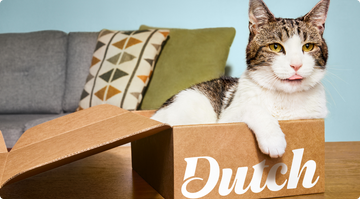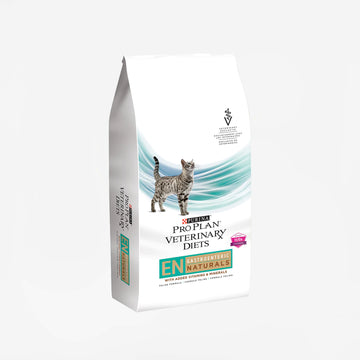Vomiting Medicine for Cats
Vomiting medicine for cats can prevent motion sickness and improve digestive health to prevent acute GI issues. Dutch can treat your pet’s vomiting from the comfort of home by diagnosing the underlying issue.
-

Cerenia (Rx)
$5.74 / unit
Multiple options available
-

Omeprazole (Rx)
$0.19 / unit
Multiple options available
-
Prescriptions without the expensive vet trip
Video chat with a vet and get new prescriptions and renewals — shipped free to you.

-

Purina Pro Plan Veterinary Diets EN Gastroenteric, Feline Formula
$47.99 / unit
Multiple options available
-

Purina Pro Plan Veterinary Diets EN Gastroenteric Naturals, Feline Formula
$55.99 / unit
Multiple options available
Frequently asked questions
Why is my cat vomiting?
Why is my cat vomiting?
Unfortunately, vomiting is a symptom. Therefore, there are many different reasons why cats vomit. Vomiting is normal in cats and may be due to eating grass, hairballs, and other benign causes. However, there are other sinister reasons why your cat might be vomiting, including the following:
- Allergies
- Cancer
- Parasites
- Foreign substance ingestion
- Intestinal obstruction
- Poisoning
If your cat vomits for more than 24 hours or persistently vomits, they should be taken to the nearest emergency vet for treatment. In addition, if your cat is experiencing any other symptoms, such as lethargy, fever, or diarrhea, it should be diagnosed by a vet as soon as possible because additional symptoms indicate a serious health issue.
How can I stop my cat from vomiting?
How can I stop my cat from vomiting?
In some cases, you don’t want your cat to stop vomiting. Cats vomit for the same reasons humans do—to eject toxins from the body. However, frequent vomiting can cause dehydration, which can harm their health. Many vets recommend fasting your cat for at least 12 hours after vomiting as long as they’re not experiencing any other symptoms.
If your cat is vomiting due to an underlying illness, your vet will aim to treat the primary cause, which should eliminate the vomiting symptom. However, if the vomiting persists, they may prescribe anti-nausea medication for cats. In addition, some less serious issues can cause vomiting, such as motion sickness. If your cat experiences motion sickness, your vet may prescribe cat anti-nausea medicine to prevent them from experiencing symptoms during travel.
What vomiting medicine can I give my cat to make them feel better?
What vomiting medicine can I give my cat to make them feel better?
Depending on the cause and severity of your cat’s vomiting, your vet may recommend one of several anti-nausea medicines for cats, including prescription and non-prescription options. Some options include the following:
- Cerenia: Cerenia is a prescription cat anti-nausea medication that treats motion sickness and vomiting by blocking certain signals in your cat’s brain.
- Metronidazole: Metronidazole is another prescription cat anti-nausea medication that treats vomiting in cats due to infections caused by parasites. It can also treat other inflammation in the GI tract, which may contribute to vomiting in cats.
- Omeprazole: Omeprazole is a prescription medication that treats stomach and esophageal problems by decreasing the amount of acid in the cat’s stomach.
- Drontal for Cats: Drontal is a medication that removes tapeworms, hookworms, and roundworms in cats and kittens that may contribute to vomiting and other GI issues.
Can I feed my cat after it vomits?
Can I feed my cat after it vomits?
Whether you can feed your cat after it vomits depends on the cause of its vomiting. Your vet may suggest fasting your cat for 12 hours to settle its stomach. In addition to using vomiting medicine for cats, you can feed them a bland digestible diet.
Consult a Dutch vet if you’re worried about your cat’s vomiting. Since there are many different causes of vomiting in cats, they should be diagnosed before treatment begins. Dutch can diagnose and treat your cat for a variety of common illnesses. We can even deliver allergy, anxiety, diarrhea, vomiting, and other cat prescription medications to your door.




